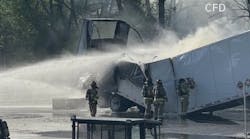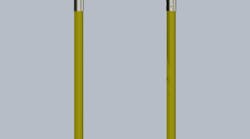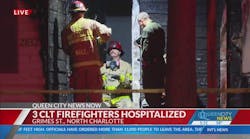If you are the officer and something serious happens, grab all those involved as soon as possible, and separately, if you can, get their stories; who said what, and who did what. Threaten the greatest punishment at your command for lying or covering up.
I was a relatively new Naval Ensign (the lowest commissioned rank equal to a 2nd Lt. in the Army). I had been a Petty Officer Second Class, a supply office clerk by day and Fire Chief by night.
Being advanced from enlisted to commissioned status is not like a promotion in civil life. You are in a whole new world.
I was assigned as the fire marshal. My guys were very proud and they never ever failed to address me and refer to me properly as Mr. Brannigan, not Frank.
The executive officer was afraid that the fire company could function only if I was on hand. He called a fire drill every time I left the station.
In the Navy at that time the sole criterion for a successful fire drill, ship or shore, was how fast you got water. Whether you could use the water properly was not a consideration. We had that situation aced.
We had 120 psi. hydrant pressure. I instructed the crew not to hook up the pumper first, at best a delay. They should just to lay a line from the hydrant to the indicated fire area and start water.
When there is no fire, they only know to judge how fast you get water, the same as on ship.
When I returned from headquarters, I was told almost tearfully, "Boy, are you gonna get it!!!. We had a fire drill and it was all fouled up."
I lined up the men and made them tell me everything that had happened. I wanted no surprises.
Reidy, the petty officer, told me that he had passed up the nearest hydrant because he saw that public works had dismantled it. As he laid to the next, the captain came running. "What's the matter with that hydrant?" he yelled. "There ain't no hydrant there," the men returned. They proceeded to lay out and start water.
I immediately went to see the captain. The fact that I had thoroughly quizzed the men meant that I was ready for any situation presented by the captain.
"Now I'm no expert," the captain said. (Always watches out for that statement.) "But was the damage control officer on the Oklahoma (on the bottom at Pearl Harbor) and commanding officer off the cruiser Chicago, (the bow was shot off)?" he asked. "But I understand that the fog nozzle on the hose line is good for oil fires, but this is a wooden building."
My man didn't think it his place to volunteer to the captain that it would also give a straight stream if required.
The captain went on. "You have ordered that the fire hoses in the buildings not be run out on a fire alarm. Aboard ship we always run out all the hoses."
A fire aboard ship endangers the entire ship. These buildings were well separated. Our building hose was linen. If it got wet, we couldn't dry it in the tropics. It would rot. Aboard ship you have linen hose only in the fire room because heat will degrade a rubber lining. I had just told a regular Navy captain something he did not know about a ship!
"I saw the men practicing the other day stripped to the waist. Flash burns are very serious," the captain said.
"We are practicing to beat the Army in an unproductive type of competition. I don't like it, but we are determined to beat them. Would you like to come by and see how fast they can switch from foolishness to actual firefighting?" I asked.
"No, you're doing a fine job there. The sun is healthy. If you want to let the men sunbathe in the afternoon, fine, but they should have their shirts on when on the engine," he said.
"AYE AYE SIR." I said. I came out rather nonplussed. I asked my sidekick Lt. Mike Miller, "What kind of a captain is he? He is the captain. I'm a boot ensign. He should have found some way to chew me out for my own good. Instead I have permission for my guys to goof off in the afternoons."
The answer came shortly thereafter when he killed himself. He was told that he was being held responsible for the loss of the U.S. cruisers Astoria, Quincy, Vincennes, and the Australian cruiser Canberra at the disastrous Battle of Savo Island.
He had written a very fine commendation to headquarters about my work. This letter solidified my position, which made it possible for me to put in place the ideas I had for Navy fire protection, and which started my career.
Go to a meeting with the high command prepared to answer any possible question. The effort may be well worth it.
THE BUILDING IS YOUR ENEMY KNOW YOUR ENEMY





